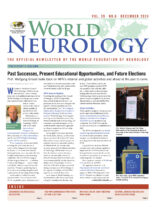Prof. Wolfgang Grisold looks back on WFN’s internal and global activities and ahead at the year to come.
By Prof. Wolfgang Grisold
Welcome to the latest edition of World Neurology, which is the last issue for 2024. I want to thank those who have published and reported for World Neurology. I encourage you to send your reports to share with our readers. And, of course, thanks to the team of editors, publishers, and all others who promote this activity.
2024 has been a successful year for the World Federation of Neurology (WFN) with a successful International Congress on Neuromuscular Diseasees (ICNMD) in Perth, Australia, two Educational Days, and the new WFN Digital Neurology Update (WNU) activities.
The e-Learning, virtual, and hybrid meetings are here to stay and are a useful tool to bring news of neurology in all parts of the world. Not only has traveling become more expensive, but visa hurdles and bureaucracy are increasing worldwide. The 2023 World Congress of Neurology in Montreal — in addition to the on-site delegates — was attended virtually by 1,400 participants from 120 countries. This participation highlights the interest in neurological updates and dissemination of neurological knowledge.
In this column, I will give a short overview of the internal aspects of the WFN, the global aspects, and education. I will finish with the announcement of the new World Brain Day 2025, which will be devoted to brain health for all ages.
WFN Internal Updates
Following the meeting of the Council of Delegates (COD) in September 2024, several decisions were made. In particular, the bylaws were changed with regard to a future president-elect and the past president. (See “WFN Digital Update and a Recap of the Council of Delegates Meeting” in the previous issue of World Neurology.) Following the meeting, we also decided to co-opt two trustees until the next COD meeting. The conditions were that all regions of the world should be represented again and our female composition of leadership should be increased.
We are glad to announce that from the North Africa, African, and Pan-Arab region, we were able to invite Dr. Imen Kacem from Tunisia, which will give us a deeper connection and understanding of African needs. Dr. Kacem is the secretary-general of the African Academy of Neurology (AFAN) and is involved with the Pan-Arab society. For Latin America, we were able to invite Dr. Briseida Feliciano from Puerto Rico who was recommended by the Pan-American Federation of Neurological Societies (PAFNS). Both of these placements will enlarge our spectrum of knowledge on the regions and will provide the WFN input on the needs of those areas.
In this issue of World Neurology, you will also find an official announcement calling for candidates for the elections in 2025. There will be a call for the new WFN president and first WFN vice president (who will take office Jan. 1, 2026), and one elected trustee (taking office immediately after the COD meeting). Only the position of the elected trustee is eligible for re-election. That position is currently held by Prof. Chandrashekhar Meshram (India).
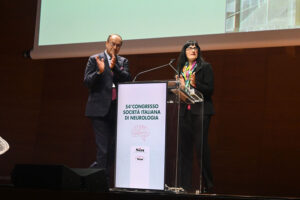
Prof. Antonio Toscano and Prof. Elena Moro represent the European Academy of Neurology at the Italian Society of Neurology in Rome.
Global Activities
From a global standpoint, the procedures on the input and establishment of the Intersectoral Global Action Plan on Epilepsy and Other Neurological Disorders (IGAP) are proceeding worldwide. The IGAP will mark the fourth anniversary of its establishment in 2025.
The WFN participated in the World Health Organization Mental Health Forum in October in Geneva, where we gave two extended statements on neurology and on the implementation of IGAP.
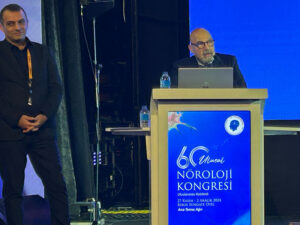
Prof. Axel Siwa, a past WFN committee chair, is honored at the Turkish Neurological Society meeting.
It is good to see so many different societies active and working together to implement the IGAP. However, it will be important to concentrate forces and to work on joint actions so we can avoid competing with one another.
See a complete overview of WHO and U.N. activities of the WFN.
The approach toward the U.N. Department of Economic and Social Council (ECOSOC) has been an important field of development for the WFN. This arena is different from the WHO, which is entirely dominated by health. The U.N. ECOSOC has many other stakeholders, and health is only one aspect.
That is why it is crucial to alert the ECOSOC to the importance of brain health as a general global concept. We have already introduced statements at U.N. meetings, which have led to several meetings with the current ECOSOC President and Canadian Ambassador Bob Rae. On Nov. 1, 2024, we were received by Ambassador Rae in New York and agreed on the cooperation between the U.N., ECOSOC, and the WFN for World Brain Day 2025. The topic will be brain health for all ages. The preparations for World Brain Day for all regions will begin in the coming weeks.
We are also glad to report that we were invited to the November meeting of the Italian Society of Neurology (SIN) in Rome, and the November/December conference of Turkish Neurological Society for sessions in their opening ceremonies.
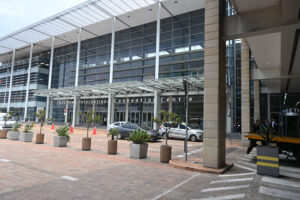
Cape Town International Convention Center.
Educational Opportunities
We are advancing with our WFN teaching and Training Centers, and for the four-year position in Cape Town we had 165 applicants. Dr. Jemima Yebaoh from Ghana has been selected for the upcoming four-year WFN training position, sponsored by the WFN.
It is important to have site visits to the Training Centers, to exchange thoughts, talk to residents, and see how the education programs proceed. This year, we have already reported that we visited Cairo and Dakar, and we decided to see all Training Centers on the African continent.
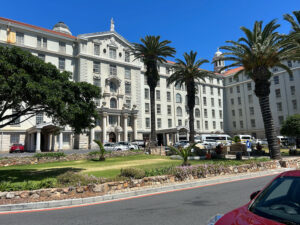
The Groote Schuur Hospital in Cape Town.
A committee composed of the president and of the secretary-general (Prof. Steven Lewis) set out to visit the Rabat Training Center in Morocco, where they were warmly received by the faculty. We were able to see the facilities and laboratories, exchange thoughts, and have interviews with faculty and the residents. The WFN finances a four-year training program in Rabat. One year of training in neuromuscular disease and one year of training in electrophysiology are financed by the ICNMD.
From Rabat, we traveled to Cape Town and were received by Prof. Lawrence Tucker, local activities chair and acting president of AFAN. He arranged for us to see the Cape Town International Convention Center where the 2027 WCN will take place.
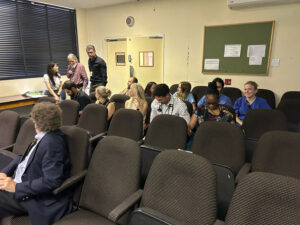
Prof. Jonathan Carr teaching at a resident session at Tygerberg Hospital.
This was followed by a full-day site visit to the neurology department at the Groote Schuur Hospital in Cape Town. We were introduced to several other departments, including intensive care, radiology, and the neuroscience department. In addition to the traditional ward rounds, we were able to take in some of the atmosphere and the performances of the Cape Town Training Center. We met the faculty and the trainees and had interviews with Dr. Desmond Koffie, our current four-year training recipient from Ghana. The concept and work of the WFN could be presented to the faculty and trainees in a lecture.
The following day, we visited Tygerberg Hospital, which is a large hospital associated with the University of Cape Town and Stellenbosch University. Here, we were able to see the facilities, patient presentations, and case discussions. We were impressed with the level of communication. The continuous cooperation between Tygerberg and Cape Town will be an asset for future WFN trainees.
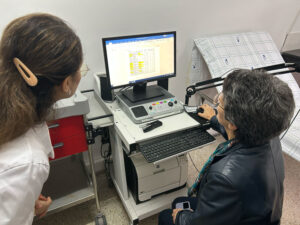
Neurophysiology lab in Rabat.
We visited Prof. Jo Wilmshurst, the chair of the Red Cross War Memorial Children’s Hospital in Cape Town. Prof. Wilmshurst is a world-renowned expert on epileptic seizures in children. We toured the department with one of her residents.
The evaluations of the Training Centers will be made available in a report at a later date. We want to thank all participants who help us keep the Training Centers in such a prolific state. The Latin American Training Center in Mexico has started its training of one person this year as part of a stroke fellowship, and we intend to have a site visit to Mexico City in 2025.
The plan and offer to establish a WFN Training Center in Asia is still open. Unfortunately, a final decision has not been reached.
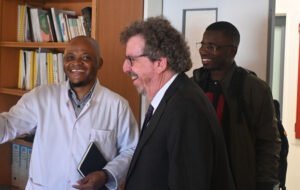
A trainee from Congo and Senegal with Secretary-General Steven Lewis.
The Training Centers in Africa have been going for 13 years and are a story of success, as they not only train neurologists, but also empower regions and catalyze the establishment of more training sites in Africa. (See Journal of the Neurological Sciences [JNS] Service Pages.)
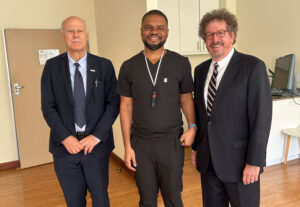
The WFN four-year trainee Dr. Koffie.
We are jointly working with the American Academy of Neurology (AAN) on the Global Advocacy Leadership Program (GALP). We have selected 20 candidates from low-middle and low-income countries. The program will start with a face-to-face meeting of all participants and faculty at the 2025 AAN Annual Meeting April 5-9, in San Diego, California. This will be followed by a series of virtual meetings that will explore relevant topics in global health, such as global organizations, funding, and more. It will culminate with a second face-to-face meeting at the WCN, followed by a formal graduation of the participants at the opening of the WCN. WCN is scheduled for Oct. 12-15, 2025, in Seoul, South Korea. This is a major project and emphasizes the need for global education in advocacy and leadership for the future.
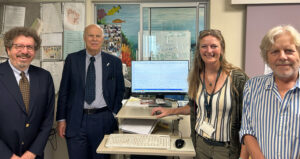
Visiting Prof. Wilmshurst at the Red Cross War Memorial Children’s Hospital in Cape Town.
Development of Educational Days, or full days of topic-related lectures, is another activity the WFN is focused on. We have collaborated with AFAN and the Asian and Oceanian Association of Neurology (AOAN) in launching these Educational Days. Topics include epilepsy, movement disorders, neuropathies, and stroke. All Educational Days remain a permanent educational resource on the WFN e-Learning hub. We also had a series of joint Educational Days on Headache with the International Headache Society, American Migraine Foundation, and Global Patient Advocacy Coalition (GPAC) in the past years.
We look forward to WCN 2025 in Seoul. The preparations are ongoing, and the plenary lecture, the scientific program, and the educational program are in an advanced state of preparation. The local venue and hotel facilities in Seoul, as well as transportation and airports, are excellent, and you can expect a smooth organization of the congress. We want to thank our Korean colleagues for participating in the development of the program and the congress.
For 2026, we intend to have another WFN Digital Update (WNU) course with an update to fill the gap between the WCN 2025 and WCN 2027.
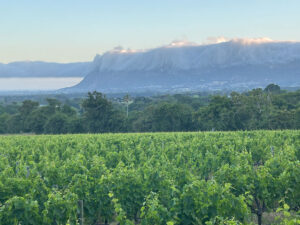
The surroundings of Cape Town invite further sightseeing. A view of the vineyards.
For 2027, we look forward to the WCN in Cape Town, which will be an important milestone for the WFN, as it is the second congress of neurology on African soil. It will definitely be a challenge in regard to funding, travel, and many aspects of organization, but we are certain we will be able to bring a great and increasingly needed opportunity to Africa.
For the WCN European Congress, which will take place in 2029, the deadline for application and interest was Nov. 30, 2024. We have six European countries that have applied: Austria, Czech Republic, Denmark, France, Hungary, and Turkey. The shortlist will be provided in the coming months, along with a list of our Professional Conference Organizer (PCO) site visits. The European WCN has always been attractive to Europeans, along with significant participation from our colleagues from other continents, to help shed a light on the important role of neurology worldwide.
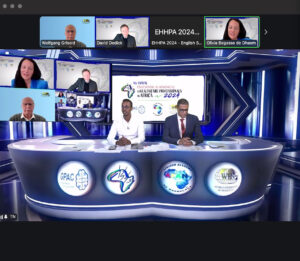
Virtual attendees at the 2024 Education in Headache for Healthcare Professionals in Africa.
WFN Media
Concerning our publications, the JNS, the eNeurologicalSci (eNS), and World Neurology are performing well and are substantially helping to increase the impact of neurology. We are grateful for our electronic media, the website, and our social media pages, which have been active in the past month and document, in a small way, the international activities of the WFN. You can also find additional WFN reports on the JNS Service Pages.
World Brain Day (WBD) will be the next major event for 2025. It will be organized with the global regions, and we will again use a professional American public relations agency to help us with the program development and to achieve worldwide awareness. Development takes about six months until the final World Brain Day is launched and is an important source of discussion. This year, we will start publishing interviews or podcasts a few months before the event to increase awareness. The final and formal conclusion will be at WCN 2025.
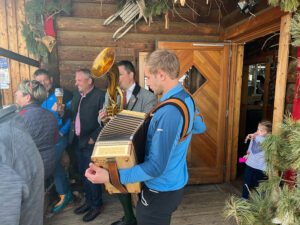
Season‘s greetings from the WFN.
I want to thank you for your cooperation and for helping the WFN with its implicit wish to increase brain health worldwide and upscale structures for neurology, particularly in countries of need. These efforts need support from all of us, and we hope for a good and successful 2025. •
